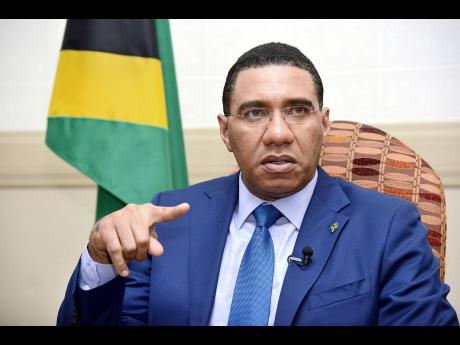Caricel woes grow - US turns up heat, allegedly provides evidence to Gov't
The United States government, through its embassy here, has reportedly turned over 'hard evidence' to the Andrew Holness administration on why it should revoke the spectrum licence to Symbiote Investments Limited, the Jamaican company that wants to become a provider of telecoms services.
However, except for its weighing into the issue publicly through a November post on social media site Twitter, where it shared concerns of the Office of the Contractor General, Jamaica's main anti-corruption arm, the embassy has not publicly said exactly what is driving its concerns about Symbiote, which trades as Caricel.
Cybersecurity concerns
Added to those concerns, though, may be the relationship between Caricel and Huawei, the Chinese company whose advance on the US market has been restricted because of national security suspicions about the links with the Chinese government. Officials fear that the Chinese could use its advance into the market to snoop on America.
Huawei Technologies, which has denied the US allegations, is third in the world in the making of smartphones and is a leader in the manufacturing of critical equipment for networking and routing for telecommunications. Australia, in 2012, excluded the firm from bidding on its networks, noting cybersecurity concerns.
The company, which was founded in 1987 by Ren Zhengfei, a former engineer in the Chinese army, is a major provider of technology services that Symbiote intends to use in providing its own services.
Ericsson, a Swedish company and Huawei's main rival, is also among the suppliers, a Caricel official, not authorised to speak on the record, told The Gleaner.
The official declined to speak on the extent of Huawei's involvement with the company but noted that the issue has been a 'key' area, one of the ongoing issues with its licence. A representative of Huawei, who has worked with Jamaica's other two foreign-owned telecoms providers, was, yesterday, unwilling to speak on the matter.
In 2012, a report from an intelligence committee of the US Congress concluded that Huawei and another Chinese rival, ZTE, were risks to the US, alleging that their equipment could be used by the Chinese to spy on the North American country. That October report, although not yielding any evidence to confirm the allegations, said "acquisitions, takeovers, or mergers" in the US must be blocked.
Two years later, in 2014, The New York Times and Germany's Der Spiegel news magazine reported on disclosures from former American intelligence contractor Edward J. Snowden, who leaked documents detailing how the US's National Security Agency had tried to access Huawei equipment.
"The documents offer no answer to a central question: Is Huawei an independent company, as its leaders contend, or a front for the People's Liberation Army?" the Times reported.
American officials here have told The Gleaner that there is a concern about the funding and true beneficiaries of Caricel, whose website does not give names of leaders, only stating that it has an executive management team and board of directors.
The issue of the real beneficiaries of the company was raised in Parliament last September when Prime Minister Andrew Holness declared "we did our due diligence" in asserting that his administration was going ahead with signing the spectrum licence, the final act in a process that started under the previous Portia Simpson Miller administration. The signing went against Contractor General Dirk Harrison's warning in a July report that the licence should not be signed and two others, granted in 2015, should be revoked because of "adverse findings" against George Neil, a Symbiote player.
Chinese companies have invested billions in the Caribbean region, whose key trading partner remains the US. The region is expected to become of even greater importance to the Asian country based on China's November policy paper on the region, which noted that Latin American and Caribbean countries "are an important part of the developing world and a major force in the international arena".
The increased interest has prompted concerns from Washington about Beijing's influence in its backyard. On a visit here in 2015, which some saw as an effort to counter Beijing's influence, outgoing United States President Barack Obama warned about "strings attached" to Chinese investments.
Today, Supreme Court judge Leighton Pusey will hear an application brought by Symbiote against actions of the Spectrum Management Authority (SMA), which the company believes are a prelude to the revocation of its $2.7-billion licence.
Last month, the SMA declined to speak on the process. But that agency, along with the Office of Utilities Regulation, would have had to get access to details of the technology services Symbiote will use before it recommended the approval of the three licences. A carrier and service provider licence were approved in May 2015.
The national security minister can revoke the licence, but the company, under the Telecommunications Act, would be eligible for compensation.
Robert Montague, the portfolio minister, has declined to speak publicly on reports that he had instructed Technology Minister Dr Andrew Wheatley to take steps to revoke the licence out of national security concerns.
A statement that Holness promised in December would come from Wheatley remains outstanding.
Symbiote has been hit with the cancellations of US visas, including ones for some of its lawyers. Those at the high court have said that the judge has asked them not to discuss the issue publicly while talks between Jamaican and US officials, including the prime minister, have not been made public.

